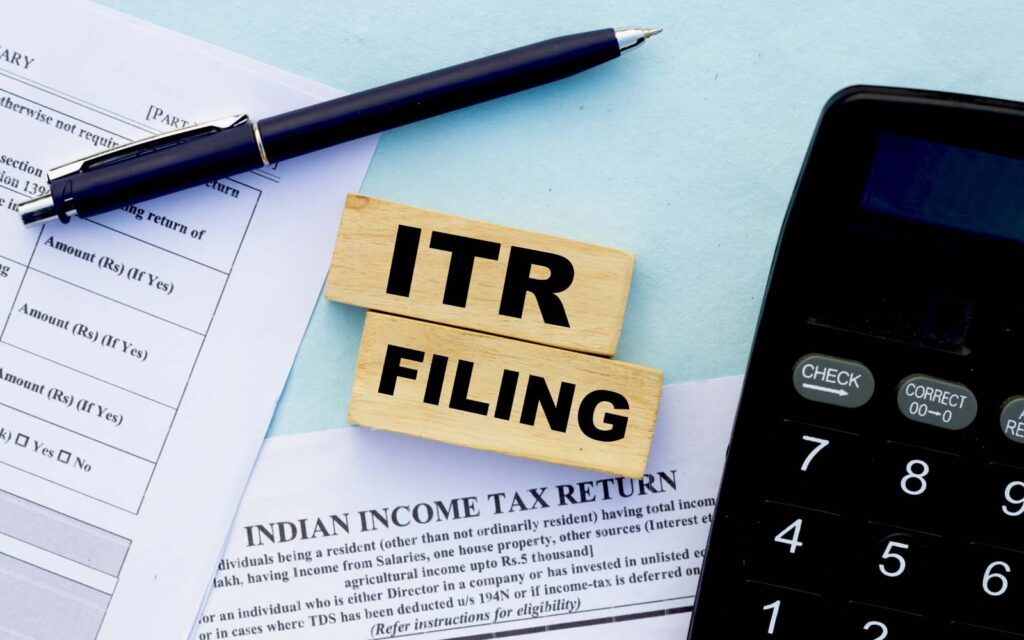Income Tax Return (ITR) Filing Hacks: Maximize Deductions & Save Tax
Filing your Income Tax Return (ITR) can often seem like a complicated process, but it doesn’t have to be. With the right strategies in place, you can easily maximize your deductions and minimize your tax liability. In this blog, we will uncover some lesser-known yet effective ITR filing hacks that will help you reduce your tax burden and keep more of your hard-earned money.
Let’s explore how you can save tax while filing your ITR and ensure that you’re fully compliant with the latest tax regulations.

Maximize Your Deductions with Section 80C
One of the most effective ways to reduce your taxable income is by utilizing Section 80C. This section offers tax deductions up to ₹1.5 lakh per financial year on investments made in specific instruments, such as:
- Public Provident Fund (PPF)
- Employee Provident Fund (EPF)
- National Savings Certificates (NSC)
- Tax-saving Fixed Deposits (FDs)
- 5-year Fixed Deposits in Banks
- Life Insurance Premiums
These tax-saving instruments not only help you build long-term wealth but also offer significant deductions that can help lower your taxable income.
Health Insurance Premiums: Section 80D Benefits
In today’s world, health insurance is essential, and it’s also a great way to save on taxes. Under Section 80D, you can claim deductions for premiums paid for health insurance policies for yourself, your spouse, children, and even your parents. Here’s the breakdown:
- Up to ₹25,000 for premiums paid for yourself, spouse, and children (if they are below 60 years).
- Up to ₹50,000 for premiums paid for senior citizen parents (above 60 years).
If you haven’t already, investing in health insurance can be a smart move, both for your well-being and your finances.
Claim Home Loan Benefits Under Sections 80C & 24(b)
If you have a home loan, there are two major tax benefits you can claim. These include deductions for both the principal repayment and the interest on the loan:
- Principal Repayment: Under Section 80C, you can claim a deduction of up to ₹1.5 lakh on the principal portion of the home loan repayment.
- Interest on Home Loan: Under Section 24(b), you can claim a deduction of up to ₹2 lakh per year on the interest paid on your home loan.
This can significantly reduce your taxable income, making your home loan not only a long-term investment but also a powerful tax-saving tool.
House Rent Allowance (HRA): Don’t Miss Out on This Tax Break
If you live in a rented accommodation and receive House Rent Allowance (HRA) as part of your salary, you can claim a deduction under Section 10(14). To claim the HRA deduction, you’ll need to provide proof of rent payments, such as rent receipts, a rent agreement, and, if applicable, your landlord’s PAN details (if the rent exceeds ₹1 lakh per year).
Claiming HRA deductions can substantially reduce your taxable income, so ensure you’re availing of this benefit if it applies to you.
Education Loans: Tax Relief Under Section 80E
Section 80E allows you to claim a deduction for the interest paid on education loans taken for higher studies. This benefit is available for a period of 8 years from the year of the loan repayment and applies to loans taken for you, your spouse, or your children.
Education loans often have a long repayment tenure, so utilizing this deduction can make a significant difference in your tax liability.
Contributions to the National Pension Scheme (NPS)
The National Pension Scheme (NPS) is a great way to build a retirement corpus while also reducing your taxes. Under Section 80CCD(1B), you can claim an additional deduction of up to ₹50,000 for contributions made to the NPS. This benefit is available over and above the ₹1.5 lakh limit available under Section 80C.
If retirement planning is on your mind, the NPS is a powerful tool for both long-term savings and short-term tax savings.
Tax Benefits on Gifts: Section 56(2)
While gifts are often seen as something personal, they can also help you save taxes. Under Section 56(2), gifts received from certain relatives—such as your spouse, parents, and siblings—are not taxable. Additionally, donations made to charitable organizations are eligible for tax deductions under Section 80G.
So, you can reduce your tax liability while giving or receiving gifts, provided the right conditions are met.
Organize Your Documents for Smooth Filing
One of the best ways to ensure you maximize all available tax benefits is by keeping your documents organized. Ensure that you have all necessary documents, including:
- Investment receipts (PPF, NSC, FD)
- Insurance premium receipts
- Rent receipts and rental agreements for HRA
- Loan repayment certificates (home loan, education loan)
- Medical bills (if claiming under 80D)
Having everything in order will make your filing process smoother and help you avoid missing any deductions.
File Your ITR on Time to Avoid Penalties
Filing your ITR on time not only keeps you compliant with tax laws but also helps you avoid penalties and interest. Late filing can result in hefty fines and missed opportunities for tax benefits. Therefore, make sure to file your return before the due date to ensure that you don’t incur additional costs.
Conclusion
Income Tax Return filing doesn’t have to be a stressful process. By utilizing these practical ITR filing hacks, you can reduce your taxable income and save money on taxes. Whether it’s through maximizing deductions, making the most of tax-saving investments, or leveraging home loan and health insurance benefits, there are numerous ways to reduce your tax liability.
